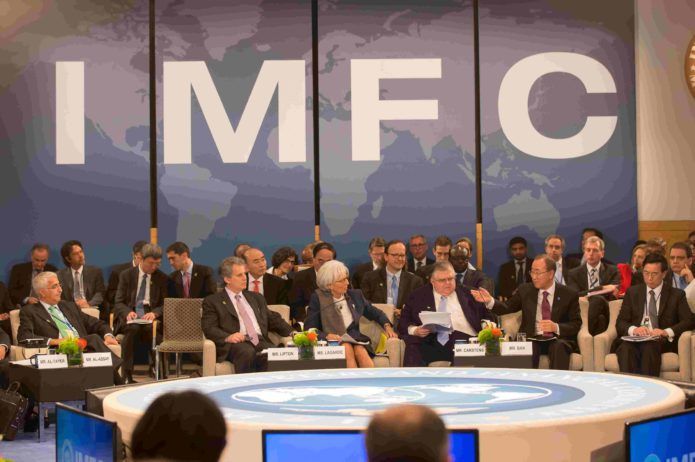The International Monetary Fund (IMF) and the World Bank have embarked on their first annual meetings on the African continent in half a century. Against the backdrop of pressing concerns surrounding mounting debt and the climate crisis that disproportionately affects impoverished nations, these vital financial institutions have been urged to adapt and reform their strategies for the betterment of African economies.
Traditionally, the IMF and World Bank host their annual gatherings of finance ministers and central bank governors at their headquarters in Washington, D.C. However, this year marks an exception, as Marrakesh, the vibrant city in southern Morocco, was initially designated to host the event in 2021. Unfortunately, the gathering had to be postponed twice due to the relentless COVID-19 pandemic. Subsequently, a seismic event that tragically claimed the lives of nearly 3,000 individuals in the vicinity of Marrakesh only a month ago nearly jeopardized the event once more. Nevertheless, the Moroccan government made the courageous decision to proceed with the meetings, demonstrating resilience and unity in the face of adversity.
IMF Managing Director Kristalina Georgieva opened the discussions with a panel titled “Africa Inspired.” She acknowledged the hardships that Morocco has endured and praised the country’s strength and resilience in the aftermath of the earthquake. During her visit, Georgieva met with schoolchildren in the Atlas region, where schools had been destroyed. However, she witnessed the determination of these students who were back in class, either in newly constructed facilities or temporary setups.
Remarkably, the IMF and World Bank’s last meetings on African soil transpired in 1973, with Kenya hosting the event at a time when some African nations were still under colonial rule. Now, 50 years later, the continent grapples with a multitude of challenges, including conflicts, military coups, persistent poverty, and natural disasters.
In a panel discussion that featured three inspirational women entrepreneurs from Africa, Georgieva emphasized the importance of seeking inspiration from the continent’s incredible young women. She affirmed, “We’re here, Africa,” celebrating the ingenuity and resilience of African women in shaping the continent’s future.
This historic gathering promises to be the backdrop for robust discussions and deliberations throughout the week. One symbolic move on the table is the allocation of a third seat for Africa on the executive boards of the IMF and World Bank. Georgieva believes that this step would empower Africa with a “stronger voice” in shaping global financial decisions.
However, the most contentious issues revolve around financial matters. The primary contributors to the IMF and World Bank are hesitant to endorse a capital increase, as it would necessitate higher financial commitments and potentially shift influence toward emerging powers like China and India. On the other hand, the World Bank is expected to confirm plans to augment lending by a substantial $50 billion over the next decade through strategic balance sheet adjustments.
World Bank President Ajay Banga is pushing for an even more ambitious agenda, aiming to boost capacity by a staggering $100 billion, or possibly as much as $125 billion, with contributions from advanced economies. Nevertheless, reaching a consensus on these critical financial matters is unlikely to transpire during the Marrakesh meetings.
In addition to these monetary considerations, global financial institutions may utilize this opportunity to revamp their quota systems. Quotas, which are intricately tied to a country’s economic performance, dictate funding allocation to the IMF, voting power, and the maximum amount of loans that member nations can access.
Outside the event venue, a group of dedicated activists voiced their concerns, brandishing banners with slogans such as “World Bank end fossil finance” and “dignity, not debt.” These non-governmental organizations (NGOs) contend that the austerity-driven solutions proposed by the IMF and World Bank are exacerbating the wealth gap between the developed and developing worlds.
In the face of these pressing challenges and the urgency to reform, the meetings in Marrakesh carry immense significance not just for Africa but for the global financial landscape as a whole. The world watches as leaders and experts converge to address the critical issues of our time.


